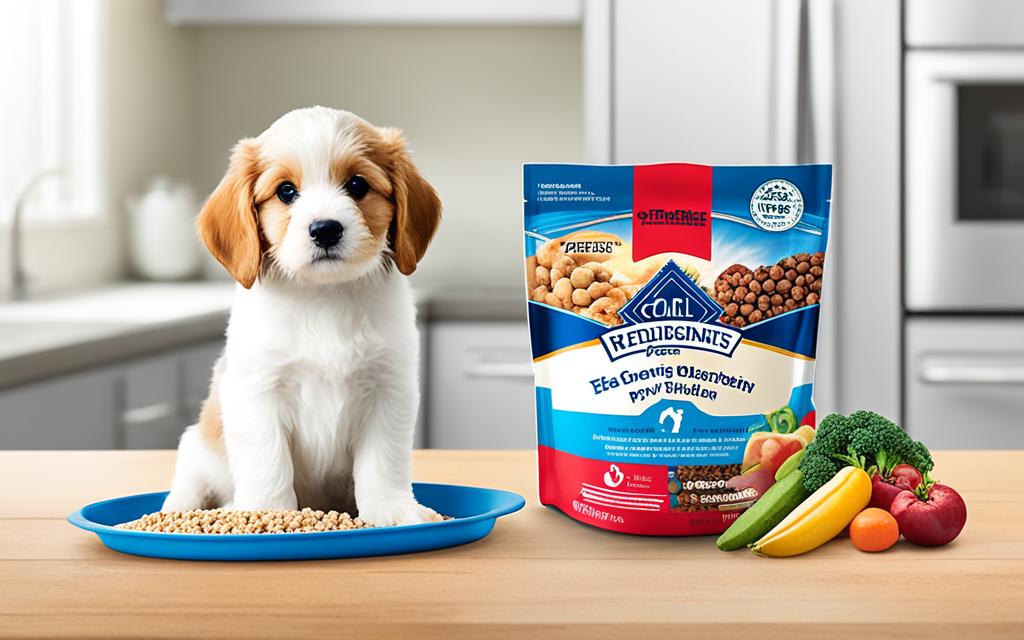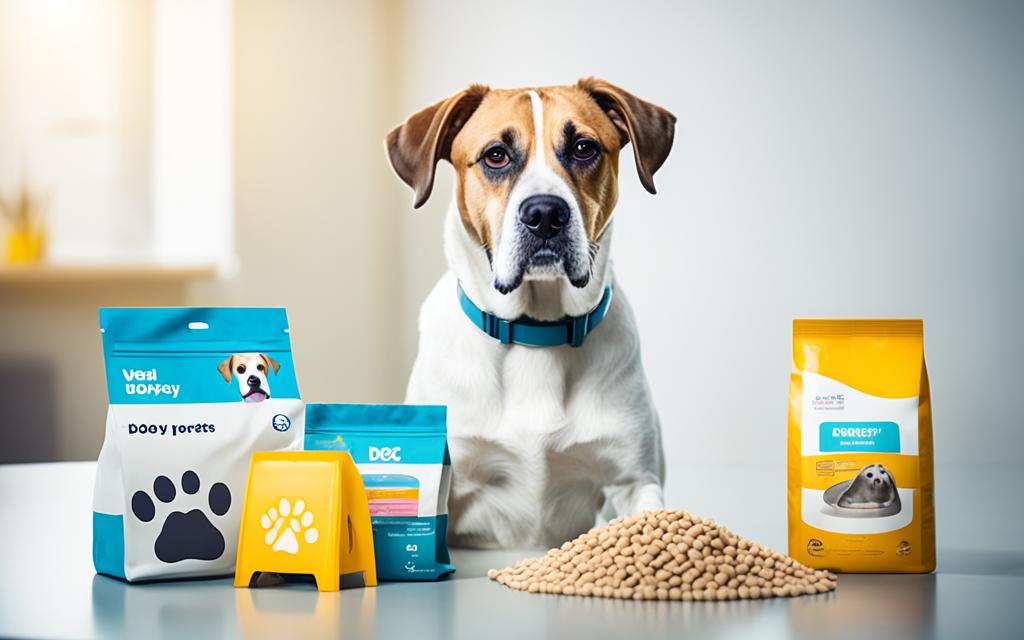Proper nutrition is key during a puppy’s early life. As they grow, their need for the right food becomes clear. A balanced diet is crucial for their health, both body and mind. Studies show that good nutrition boosts their immune system, strengthens their bones and teeth, and helps their brain grow.
This knowledge helps puppy owners support their pets’ health for life. By focusing on the right nutrition, owners can help their puppies thrive.
The Role of Nutrition in Early Puppy Growth
Proper nutrition is key during the early growth stages of puppies. The first few months are crucial for their rapid physical changes. They need proteins, fats, vitamins, and minerals for muscle, organ, and body structure development. A balanced diet affects not just their growth but also their health later on.
The Association of American Feed Control Officials (AAFCO) says getting the nutrition right is crucial. It helps puppies grow at the right pace and prevents obesity. Puppy food is made to give them the energy and nutrients they need during these important years. This focused nutrition approach helps prevent growth problems.
Here’s a quick overview of the essential nutrients and their roles in early puppy growth:
| Nutrient | Role in Growth |
|---|---|
| Proteins | Supports muscle development and tissue repair |
| Fats | Provides concentrated energy and supports brain development |
| Vitamins | Essential for immune function and metabolic processes |
| Minerals | Important for bone development and overall health |
Understanding Puppy Nutritional Requirements
Puppies grow fast in their early days, making their diet crucial for healthy growth. The right diet gives them the essential nutrients they need to do well. The mix of ingredients in dog food is key to their health.
Key Nutrients for Growing Puppies
A good diet for puppies has many nutrients that help them grow and develop. Important parts include:
- High-quality protein: Sources like chicken, beef, and fish are key for growing tissues.
- Essential fatty acids: These help the brain grow and keep the coat shiny.
- Calcium and phosphorus: These minerals are vital for strong bones and teeth.
- Puppy vitamins: These vitamins and antioxidants boost the immune system against diseases.
Age-Specific Dietary Needs
Puppies have different dietary needs at different ages. Puppies under six months need a diet full of nutrients to support their fast growth. As they get from 6 to 12 months old, they need a different kind of food to keep their growth steady.
This change helps prevent weight problems and joint issues later. It’s a good idea to talk to a vet to make a diet plan that’s right for your puppy’s age and size.
| Age Range | Dietary Focus | Key Nutrients |
|---|---|---|
| Up to 6 months | High-calorie, nutrient-rich formula | Protein, essential fatty acids, vitamins |
| 6 to 12 months | Balanced maintenance diet | Calcium, phosphorus, moderate protein |
Importance of Proper Nutrition for Puppy Development
Proper nutrition is key for a puppy’s growth, affecting both their body and behavior. Puppies need a diet full of important nutrients to do well. It’s important for pet owners to know how to feed their puppies right.
The food a puppy eats greatly affects their growth. It helps with muscle building and keeps their immune system strong. Feeding them the right mix of proteins, fats, vitamins, and minerals helps them grow strong and healthy.
Well-fed puppies often learn better and are emotionally stable, leading to happy adult dogs. A varied diet supports their overall growth, including their health and mood.
Choosing the Right Puppy Food
Choosing the right puppy food can be tough for pet owners. Many factors need to be considered. It’s key to pick a food that gives your puppy complete and balanced nutrition. Look for products that meet AAFCO standards. This means they’ve been tested for quality and nutritional value.
When looking at different puppy food brands, focus on high-quality ingredients. Real meat should be the first thing listed, showing it has a lot of protein. Also, think about what your puppy’s breed and size need. Big breeds might need different food than small breeds, especially for their growth and diet.
Deciding between dry kibble and wet canned food is also important. Dry kibble is good for dental health, while wet food might taste better for some puppies. Carefully checking out different options helps make sure your puppy gets the right nutrition for a strong and healthy life.
Before you decide on puppy food, talk to your vet. They can give you advice based on what your puppy specifically needs.
| Puppy Food Brand | First Ingredient | AAFCO Approved | Type |
|---|---|---|---|
| Blue Buffalo | Deboned Chicken | Yes | Dry |
| Hill’s Science Diet | Chicken Meal | Yes | Dry |
| Royal Canin | Chicken by-product Meal | Yes | Canned |
| Nutro | Real Salmon | Yes | Dry |
Homemade vs. Commercial Puppy Food
Dog owners often have to choose between making their own puppy food or buying it. Each choice has its own benefits that can help a puppy stay healthy and grow well. It’s important to know the good things about homemade diets and commercial food to make a smart choice.
Benefits of Homemade Diets
Homemade puppy food lets owners pick the ingredients themselves. This way, you can use fresh, whole foods without harmful additives or fillers. Making your own dog food means you can meet your puppy’s special nutritional needs, like for those with allergies or sensitivities.
But, making homemade diets work right takes knowledge. It’s key to talk to a vet before starting to make sure you’re giving your puppy everything they need. Getting advice from experts can help avoid any nutritional problems.
Choosing Quality Commercial Products
Choosing commercial puppy food has its own things to think about. It’s important to pick brands known for good ingredients. Look for products that say they are “complete and balanced” for puppies. Trusted brands like Royal Canin, Hill’s Science Diet, and Purina Pro Plan are good choices because they have recipes that help puppies grow healthy.
When looking at commercial food, read the ingredient list and nutritional info closely. Choosing top-notch dog food brands makes sure your puppy gets the best nutrition during their early years.
| Aspect | Homemade Puppy Food | Commercial Puppy Food |
|---|---|---|
| Ingredient Control | Full control over fresh ingredients | May contain preservatives and fillers |
| Tailored Nutrition | Can meet specific dietary needs | Formulated for general puppy requirements |
| Preparation Time | Time-consuming | Convenient and ready to serve |
| Consultation Needed | Essential for balanced nutrition | Veterinary recommendations advisable |
Common Nutritional Deficiencies in Puppies
Puppies need the right nutrients to stay healthy. If they don’t get what they need, they can get sick. It’s important for pet owners to know about these common issues. Some of the main ones are:
- Calcium Deficiency: Not enough calcium can cause bone problems and slow down growth.
- Protein Deficiency: Too little protein can make puppies grow slower and have weak muscles.
- Vitamin A Deficiency: Not enough vitamin A weakens the immune system, making puppies more likely to get sick.
- Vitamin D Deficiency: Low vitamin D levels make it hard for puppies to absorb calcium, leading to bone and growth issues.
Spotting these deficiencies early can help fix the diet. It’s key to talk to a vet if you notice any nutrition problems. Taking action quickly can help keep your puppy healthy and happy.

Impacts of Poor Nutrition on Puppy Health
It’s crucial to know how poor nutrition affects puppy health for a happy, healthy pet. Poor diets can lead to short-term and long-term problems, impacting a puppy’s health.
Short-Term Effects
Poor nutrition in puppies can make them feel tired and not want to play. They might also have stomach issues like diarrhea or vomiting. These problems can slow down their growth and stop them from reaching their full potential.
Long-Term Consequences
Long-term, poor nutrition can really affect a dog’s life. It can cause obesity and joint issues. A bad diet might also lead to chronic diseases, making hereditary conditions worse. It can even change their behavior, making them more anxious or aggressive.
Planning a puppy’s diet early is key to avoiding serious health problems later. Making the right food choices is crucial for their health.
| Impact | Short-Term Effects | Long-Term Consequences |
|---|---|---|
| Lack of Energy | Inactivity, lethargy | Potential obesity |
| Digestive Issues | Diarrhea, vomiting | Chronic gastrointestinal problems |
| Growth Impairment | Delayed growth spurts | Persistent puppy growth problems, stunted growth |
| Behavioral Changes | Reluctance to play | Anxiety or aggression issues |
Supplementing Your Puppy’s Diet
Adding supplements to a puppy’s diet can make a big difference. These supplements are key for a healthy, growing puppy. They fill in the gaps when natural food doesn’t have everything they need. Supplements help ensure your puppy grows and develops well.
Common additions include:
- Omega-3 fatty acids: Great for promoting joint health and improving coat quality.
- Glucosamine: Supports the development of strong bones and joints.
- Probiotics: Helps maintain digestive health and boost the immune system.
It’s important to talk to a vet before adding supplements to your puppy’s diet. Every puppy is different, based on their breed, size, and health. Too many supplements can cause problems, not help.
To properly supplement your puppy’s diet, you need to know what they need and how much. A balanced approach is key for a healthy start for your puppy.
Monitoring Your Puppy’s Growth and Weight
Keeping an eye on a puppy’s growth and weight is key to their nutrition. Pet owners should weigh their puppies every week or two. This helps track progress and adjust diets as needed.
It’s vital to know how to keep puppies at a healthy weight. The right body condition score helps avoid obesity and its health risks. Regular checks help spot any sudden changes early.
Talking to a vet is a great way to manage your puppy’s weight and growth. Vets can give advice that fits your puppy’s breed needs.
![]()
| Weight Tracking Schedule | Age Range | Expected Weight Increase |
|---|---|---|
| Weekly | 0-4 months | 1-2 pounds per week |
| Bi-weekly | 4-6 months | 2-4 pounds every two weeks |
| Monthly | 6-12 months | Varies by breed |
Checking on your puppy’s weight regularly is crucial for their health. Watching these numbers closely helps ensure a happy, healthy life for your puppy.
Conclusion
Proper nutrition is key for a puppy’s health and happiness. It helps them grow fast and stay healthy as adults. Giving your puppy the right food supports their body and mind.
This summary shows how important it is for owners to pick the right food for their puppies. By choosing quality food, owners help their puppies stay healthy for a long time. Good feeding habits are important for a puppy’s whole life, not just when they’re young.
Putting effort into a good diet is worth it for your puppy’s future. A nutritious diet helps your puppy grow, be healthy, and live a happy life. Giving your puppy the best nutrition is a caring act that lasts a lifetime.




